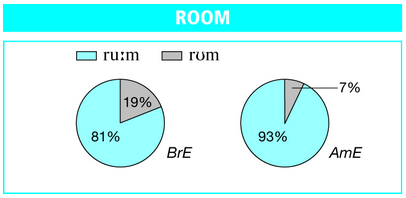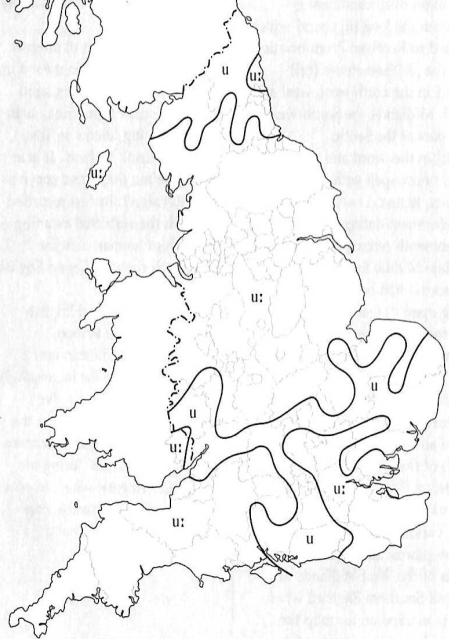hellog〜英語史ブログ / 2020-11-20
01 02 03 04 05 06 07 08 09 10 11 12 13 14 15 16 17 18 19 20 21 22 23 24 25 26 27 28 29 30
2020-11-20 Fri
■ #4225. room の長母音の短母音化 [vowel][sound_change][eme][map][rp][prestige]
連日 <oo> の綴字に対応する発音の話題を取りあげている (cf. 「#4223. なぜ同じ <oo> の綴字なのに book と food では母音が異なるのですか? --- hellog ラジオ版」 ([2020-11-18-1]),「#4224. blood, flood だけでなく soot も?」 ([2020-11-19-1])) .今回は,誰でも知っている <oo> を含む英単語 room を取り上げ,言語変化とその複雑さの一端を示したい.
room といえば日本語でも「ルーム」だし /ruːm/ と長母音をもつのは当たり前と思われるかもしれないが,実は短母音を示す /rʊm/ も決して稀ではない.LPD の Preference polls によると,短母音化した発音は,イギリス英語では19%ほど,アメリカ英語では7%ほど確認される.

さらに複合語の bedroom についていえば,イギリス英語では37%までが短母音で発音されるという.ほかには broom についても,やはりイギリス英語で8%が短母音を示す.また,groom にも短母音の発音があり得る.
room, bedroom, broom については「#1353. 後舌高母音の長短」 ([2013-01-09-1]) でも取り上げた話題だが,これを説明する歴史的な音変化 /uː/ → /ʊ/ は,「#547. <oo> の綴字に対応する3種類の発音」 ([2010-10-26-1]) で触れた通り,典型的には16--17世紀(初期近代英語期)に生じたものとされている.しかし見方によっては,同変化の遅れた波が,今頃ようやく問題の3語にたどり着きつつあるともいえる.
しかし,事はそう単純ではなさそうだ.Upton and Widdowson (39) による room のイングランド諸方言の発音に関する解説によれば,その方言分布も歴史も詳しく判明しているわけではない.
At this period [= as late as the seventeenth or even the eighteenth century] such words as BOOK, HOOD and SOOT, which had in the later Middle and early Modern English periods been pronounced with [uː], came to be pronounced with [u], and although ROOM was not properly part of this change it seems to have become connected with it for some speakers. Why the short sound in ROOM should have acquired the geographical distribution for the non-standard dialects which the map shows is quite unclear.
Although there is no firm evidence to support the claim, it is likely that the [u]- innovation in ROOM acquired some considerable popularity for a while in Received Pronunciation. Today it ranks as a quite acceptable minor variant in that accent, but not long ago its status was even higher. Daniel Jones (Outline of English Phonetics, para. 318) writes that 'In broom (for sweeping), groom, room, and soot both uː and u are heard, the u-forms brum, grum, rum, sut being perhaps more usual in Received English.'
Today one would not expect an RP speaker to use [uː] in SOOT. Conversely, although [u] is shown as an RP variant in pronouncing dictionaries of British English for use in several words with -oo- spellings, it is now somewhat unusual for such a speaker to be heard using it in BROOM, ROOM and (especially) GROOM. In a survey of a somewhat less-than-representative sample of British English speakers, Wells (Pronunciation Dictionary) discovered an eighty-two percent preference for [uː] in ROOM and a ninety-two percent preference for its use in BROOM.
RP においては,上記の単語で短母音版の発音がむしろ威信 (prestige) をもっていた可能性があるというから驚きだ.現在において短母音版の発音は,許容されるとはいえ,soot を除けばあくまでマイナーな発音というべき位置づけだが,それに対する社会的な評価は,直近数世代を通じて揺れてきたという歴史は興味深い.
数百年という規模で生じてきた短母音化という見方が一方である.他方で,この数世代の間に長短母音の変異の社会的な位置づけが揺れてきたという見方がある.その2つの歴史的文脈を受け継ぎつつ,現在 room に2つの発音が併存している,この事実が重要である.
補足として,Upton and Widdowson より,room の2つの発音の方言分布を示しておこう.

・ Wells, J C. ed. Longman Pronunciation Dictionary. 3rd ed. Harlow: Pearson Education, 2008.
・ Upton, Clive and J. D. A. Widdowson. An Atlas of English Dialects. 2nd ed. Abingdon: Routledge, 2006.
2026 : 01 02 03 04 05 06 07 08 09 10 11 12
2025 : 01 02 03 04 05 06 07 08 09 10 11 12
2024 : 01 02 03 04 05 06 07 08 09 10 11 12
2023 : 01 02 03 04 05 06 07 08 09 10 11 12
2022 : 01 02 03 04 05 06 07 08 09 10 11 12
2021 : 01 02 03 04 05 06 07 08 09 10 11 12
2020 : 01 02 03 04 05 06 07 08 09 10 11 12
2019 : 01 02 03 04 05 06 07 08 09 10 11 12
2018 : 01 02 03 04 05 06 07 08 09 10 11 12
2017 : 01 02 03 04 05 06 07 08 09 10 11 12
2016 : 01 02 03 04 05 06 07 08 09 10 11 12
2015 : 01 02 03 04 05 06 07 08 09 10 11 12
2014 : 01 02 03 04 05 06 07 08 09 10 11 12
2013 : 01 02 03 04 05 06 07 08 09 10 11 12
2012 : 01 02 03 04 05 06 07 08 09 10 11 12
2011 : 01 02 03 04 05 06 07 08 09 10 11 12
2010 : 01 02 03 04 05 06 07 08 09 10 11 12
2009 : 01 02 03 04 05 06 07 08 09 10 11 12
最終更新時間: 2026-01-27 10:29
Powered by WinChalow1.0rc4 based on chalow